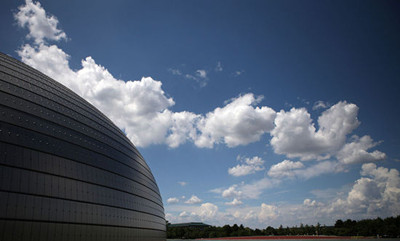This is NEWS Plus Special English.
Beijing has seen many azure blue sky days since August 20th, when the city began taking strict control of industrial and vehicle emissions ahead of the military parade on September 3rd.
The capital's environmental watchdog said the air quality in Beijing was as good as that in some metropolises of developed countries, including Paris, London and Moscow.
The daily concentration level of PM2.5 averaged only 18 micro-grams per cubic meter between August 20th and September 3rd. PM2.5 refers airborne particles less than 2.5 microns in diameter that can penetrate the lungs and harm health.
The PM2.5 reading was down 70 percent year-on-year, thanks to the restrictions including the suspension of work at polluting companies and construction sites, along with sharply curtailed driving.
The Beijing Environmental Protection Bureau said local residents enjoyed good quality air during the past few weeks.
Beijing saw clear skies on September 3rd when a military parade was held marking the 70th anniversary of the end of World War Two. Measuring 8 micro-grams per cubic meter, the PM2.5 level during the day was the lowest in two years.
The bureau said the reduction on PM2.5 was mainly a result of the restriction of coal consumption and vehicle emissions in Beijing and its neighboring cities.

This is NEWS Plus Special English.
When looking for a balance between independence and health care in later life, China's older generation must navigate an under-developed, and overwhelmed sector.
Many Chinese believe it is the responsibility of children to care for their aging parents, and often grandparents, too. In some cases, those that put their elderly family members into nursing homes are considered shameful for shirking their filial responsibility.
By the end of last year, there were 200 million Chinese, or 16 percent of the population, aged 60 or older. The number is expected to increase by around 10 million every year.
Vice Minister of Civil Affairs Zou Ming said "China is getting old before getting rich". With a rapidly aging population and many people leaving their hometowns in search of work, suitable elderly care options must be found.
The central government is championing home-based care and services for those that do not need the support of special facilities.
In 2013, the State Council, China's cabinet, issued a guideline calling for the incorporation of home-based care, community support and nursing resources.
According to the guideline, home-based care should be a fundamental part of the elderly care system.












